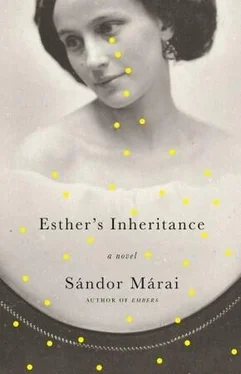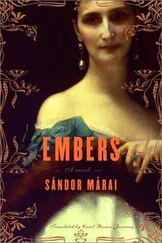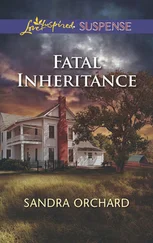T he telegram that brought news of disaster and delight had arrived on Saturday about noon. I can only faintly remember the afternoon and evening before Lajos’s arrival. No. Nunu was right: I was no longer frightened of Lajos. We can be frightened by those we love or hate, by someone who is very good or quite ruthless or had quite deliberately betrayed us. But Lajos had never been awful to me: true, he wasn’t good, either, in the sense school textbooks describe goodness. Did he betray me? No, I never felt betrayed by him. Certainly, he lied: he lied the way the wind howls, with a certain natural energy, in high spirits. He could tell the most wonderful lies. For example, he lied that he loved me, only me. Then he married my little sister, Vilma. Though later I became convinced that he hadn’t planned all this, it wasn’t a plot or a conspiracy, there was nothing intentional about it: Lajos never did anything deliberately wicked. He told me he loved me — and I don’t doubt he meant it, even now — but he happened to marry Vilma, maybe because she was prettier, maybe because that day the wind happened to be blowing from the east, or maybe because that was what Vilma wanted. He never said why.
That night before the expected arrival of Lajos — it would be the last time in this life, as I well knew — I stayed up a long time arranging various mementos, preparing for his visit, and reading his old letters before falling asleep. Even today I believe, it is a superstition of mine — and reading his old letters I felt this once again with particular certainty and force — that Lajos had some hidden source of power, that he was like those little streams you find on high mountains that wind aimlessly down the slopes and disappear without a trace in the depths of a cave. No one used or directed that power. Now, reading over his letters the night before he came back to haunt me, I marveled at the fierce workings of this aimless energy. In each of his letters he addressed me with power enough to move anyone — especially a highly sensitive woman — indeed, whole crowds, even masses. It wasn’t that he had anything particularly “significant” to say, nor did I detect any particular literary talent in his ideas: his epithets were scrappy, his style undisciplined — but his manner, the voice audible in every line of his writing, was unmistakably his and his alone! He was always writing about the truth, about some imagined truth that he had just realized and urgently wanted me to know.
He never wrote about his feelings, not even his plans, instead he described the town where he happened to be staying so vividly the reader could immediately see the streets and the room where Lajos was writing the letter, could hear the voices of people who had said something clever or amusing the day before. On top of this he would lay out the great idea that was currently demanding his attention, and all in such miraculously authentic terms that everything seemed larger than life. It was just that — and even this tin-eared reader could sense it — none of it was true, or rather it was all true but not as Lajos wrote it. His description of the town was as scrupulously accurate as any topographer’s, but it was a lunar town, pure moonshine. He took extraordinary care to bring this false-truth alive. It was the same with people and scenery. Everything was described with the utmost attention to detail.
I read the letters and was moved. Maybe — it is possible — we were too weak for him. Around midnight a fierce warm wind played around the house; I got out of bed and closed the windows. I would not want to excuse my feminine frailty, I have no time for it, really, but that midnight I stood in front of the long mirror that used to hang above my mother’s dressing table and took good stock of myself. I knew I was not yet old. By some peculiar whim of fate I had not aged much in twenty years: the years had left few marks on me. I was never plain, but mine was never the sort of beauty to which men seem to be drawn. It was respect and a kind of timid languishing that I inspired in them. Thanks to gardening and possibly my own metabolism I had not put on weight: I was tall, straight, and well proportioned. I had a few gray hairs now, but they were imperceptible among the light blond of the rest, my most characteristic feature. Time had drawn a few very delicate lines round my eyes and mouth, nor were my hands as they had been, having grown a little rough with housework. Nevertheless, when I looked in the mirror, I saw a woman waiting for her lover. It was, of course, a ridiculous momentary idea. I had passed forty-five. Lajos had long been living with someone else, he might even be married. I hadn’t heard anything from him for years. Occasionally I saw his name in the papers, once with regard to some political scandal. It would not have surprised me if one day Lajos had become famous, or, indeed infamous. But the scandal quickly died away. Another time I read that he had fought a duel with someone in the courtyard of some barracks, had fired into the air and was uninjured! And this was all very much in keeping with his character, both the duel and the being uninjured. I have no idea whether he has ever been seriously ill, either. His fate lay elsewhere, I thought. And I got back into bed, together with my letters and memories and the sour-sweet consciousness of my lost youth.
I would be lying if I claimed to have felt particularly unfortunate in those hours. Oh yes, there was a time some twenty or twenty-two years ago when I was unfortunate. But the feeling gradually melted away, the wound scabbed over. It was an unfamiliar strength that enabled me to suppress the upwelling of pain. There are wounds time does not heal. I knew that I myself was not healed. Only a few years after our “separation”—it is very difficult to find the right word for what happened between Lajos and me — the unbearable suddenly became natural, simple. I no longer needed anything; I didn’t need help, there was no need to call the police or the doctor or the priest. Somehow or other I continued living…Eventually there was a circle of friends, people who assured me that they needed me. A couple of them even proposed: Tibor, who was some years younger, and Endre, whom only Nunu addresses in the deferential way, as “Mister Endre,” though he is not a day older than Lajos. Somehow or other I managed this game or accident quite well. The suitors remained good friends. That night I also reflected how life, in some miraculous fashion, had been kinder to me than I could ever have hoped.
I t was after midnight that Nunu came into my room. Our house still has no electric light — Mama had no time for the invention, and after her death we kept postponing it because of the expense — so Nunu’s entrances tend to be a little theatrical. This time, too, she stood there with the flickering candle in her hand, her gray hair standing up everywhere, in her nightgown, like some midnight apparation. “Lady Macbeth,” I said, smiling. “Come over here and sit down.” I knew she would look in on me that night.
Nunu is the family member who “stands in” for all the other family members in the house. She had arrived thirty years before, part of the nomadic process whereby families drift about the world like mythical figures: she arrived out of an archaic past, part of the genealogical fabric of great-aunts and grandnieces, just for a few weeks. Then she stayed because she was needed. And later she stayed because everyone else in the family had died off before her, so Nunu was left, decade on decade, step by step, to ascend the ladder of family hierarchy, until she finally took Grandmother’s place, moved into the room upstairs, and inherited her sphere of influence. Then Mama died, and then Vilma. One day Nunu noticed that she was not “standing in” for anybody; she noticed that she, the newcomer — she, the remnant — was the only family.
Читать дальше












